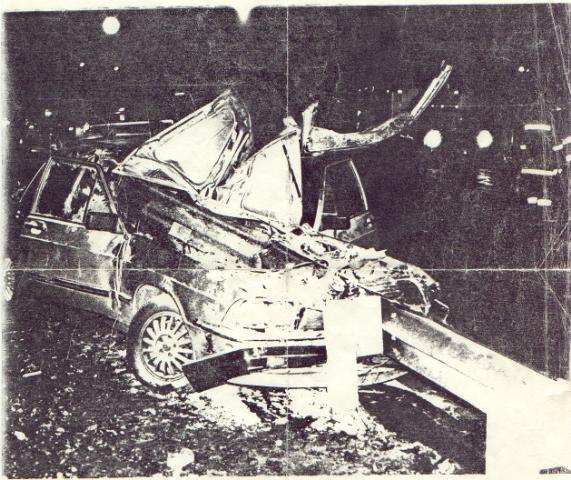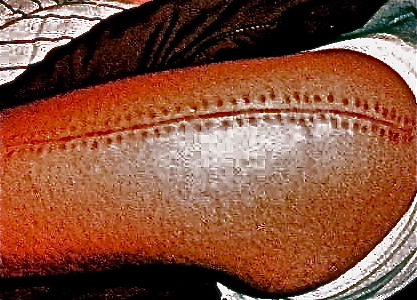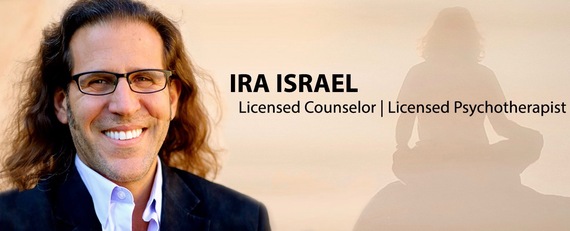I sat with His Holiness the Dalai Lama in Paris in 1993 and became intrigued with Buddhism mostly out of my morbid philosophical fascination with him: How could a man who has had 2 million of his devoted followers ruthlessly and brutally murdered not want revenge, claim that the Chinese were his greatest teachers, and chuckle often and joyously when teaching Buddhism?
Being dense, skeptical, and fear-based, I needed a good 20 years of watching the endless eye-for-an-eye, revenge-based, "let's pay our suffering forward" -- Palestinian/Israeli conflict -- as well as many conflicts elsewhere around our planet -- to truly understand Gandhi's observation that, "An eye for an eye only leaves the whole world blind."
Although Buddhism was misappropriated by the Japanese in World War II -- similar to the way Nietzsche was co-opted by the Nazis -- in his quest to understand and find an end to suffering, the Buddha said (and I'm paraphrasing): "I must break this chain of unskillful solutions. I will not pay my suffering forward. It stops with me."
(NOTE: Photos may be disturbing to readers.)

After a workshop on compassion with Fred Luskin and Rick Hanson at CAL Berkeley in the autumn of 2009, I was inspired to try a new, more skillful solution: After 25 years of silence, I located the driver of the car (on Facebook, of all places) in which my body and face were smashed to pieces, and after an extremely lengthy and gut-wrenching dialogue about exactly what had transpired on the night of Jan. 6, 1985 was able to utter the words, "I forgive you."
This did not mean that I condoned his behavior.
This did not mean that I wanted to be friends with him.
This meant I released my right to resent that the car accident happened.
It meant that I was finally ready to ask for my freedom.
You can't change the past, so any resentment, anything that your mind tells you should have been otherwise -- any shoulda-woulda-coulda-didn't, as I've stated in many other blogs -- is like "drinking poison and waiting for the other person to get sick."
I had clung to my unskillful solutions for 25 years -- resentment, revenge fantasies, sucking other people into my drama, being addicted to my grievance story, victimhood, whinging and whining -- all of which were miraculously released by uttering three little words.
I.
Forgive.
You.
I will not pay my suffering forward; it stops with me.
"We perseverate in bad choices and blame others for not trying new solutions," said Fred Luskin during a later lecture at Spirit Rock.

Last winter during another workshop (little known fact, but personal growth classes, healing journeys, and transformational workshops are actually mandatory for California residents and if you fail to comply Jerry Brown personally asks you to vacate the state), there was a yet another crack in my consciousness -- "That's where the light gets in," says Leonard Cohen -- and I was ready to try on another new, more skillful solution: "I CHOOSE the scars on my face. I CHOOSE the scars on my leg -- just like I chose my tattoo," which in some subconscious way had been a symbolic reclamation of my body.
"I am SUPPOSED to look like this. It is NECESSARY for me to have this discomfort." Voila!
"You either accept your life or change it. Any other position is insane," says Eckhart Tolle.
The past is history; the only thing that remains is the narrative. And any part of the narrative that does not accept and embrace one's life or adds the judgement "that should not have happened" pulls one backward into a no-longer-existent past, hinders one from showing up authentically in the present, and places limits on one's not-yet-existent future.
I mean, in the grand scheme of things, it's completely up to me if I walk around for the next 50 years whinging and whining, bitching and moaning about something I can't change... or muster up the balls for a little radical acceptance (thank you Tara Brach).
Right?
I may be dense, skeptical and fear-based.
But every 25 years or so, there is a crack in my consciousness.
